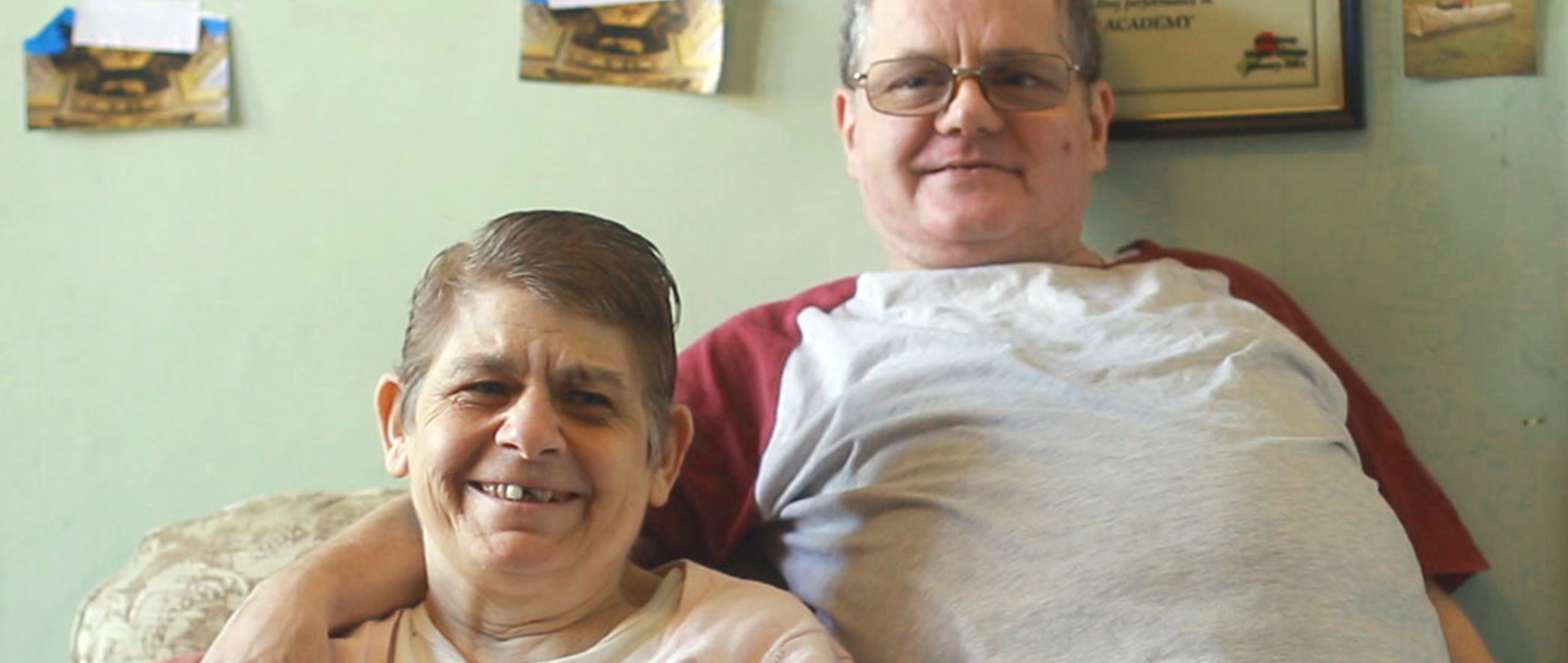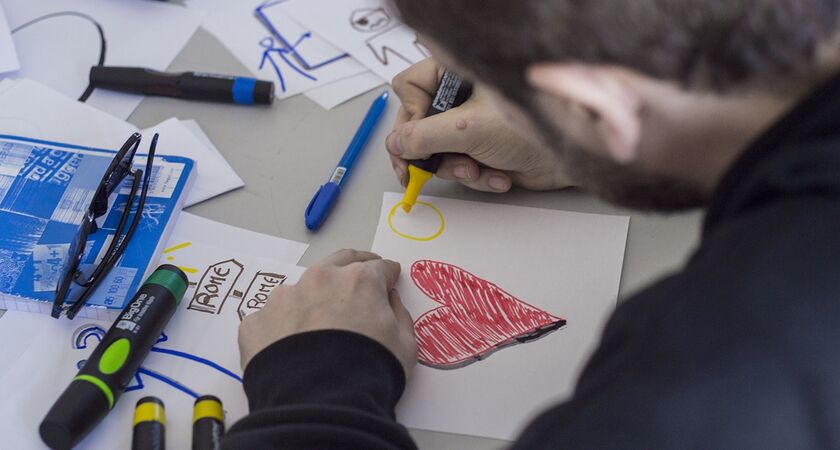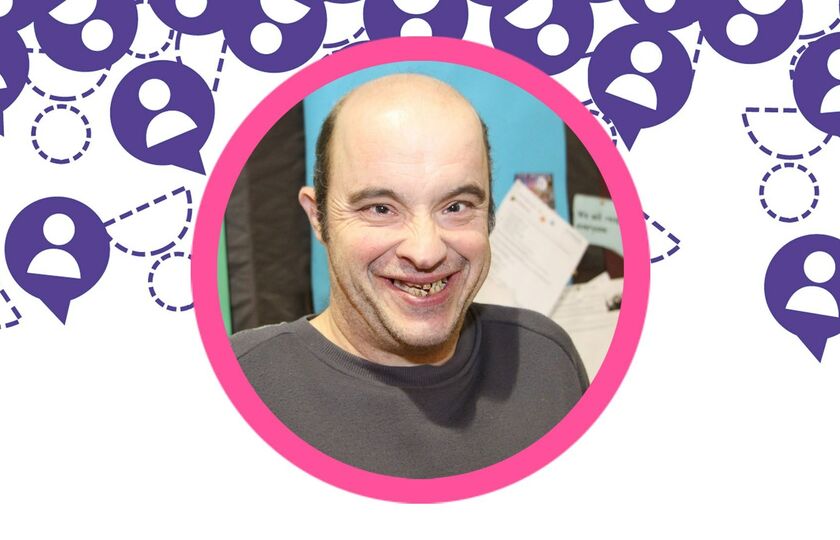The U-Night Group has now developed a similarly formatted pack about relationships, sex, and sexual self-advocacy. The box is jam-packed with interactive resources that you can use to support learning and discussions about relationships and intimacy with self-advocates and staff. Information on how to buy here
Supported Loving toolkit
Supporting relationships

Supported Loving is all about equipping staff to support people to enjoy close and intimate relationships.
Research by Supported Loving shows that many people with learning disabilities and autistic people want to form intimate relationships but face significant barriers. These challenges include limited opportunities to meet others, a lack of accessible information about relationships and sex, and insufficient support to develop and maintain relationships. Without support, people are at greater risk of loneliness, isolation, and, in some cases, exploitation or abuse. The Care Act (2014) and CQC (Care Quality Commission) regulations recognise the importance of supporting people to develop and maintain relationships as a key part of their overall wellbeing. These frameworks make it clear that this is not an optional extra but a fundamental human need that must be actively supported if needed.
Social care is often thought of as focusing on practical tasks like managing health, cooking, and finances, and while these aspects are undoubtedly important, they should not overshadow the need for emotional and social support. Helping people build relationships, including intimate ones, is just as essential. People who access social care are just as entitled to these aspects of life, just like anyone else, and should not be excluded from the possibility of meaningful relationships. However, many professionals in social care say they want to help but feel unsure about how to approach these sensitive issues. Training often focuses primarily on health, safety, and risk management, with little emphasis on relationships, intimacy, or emotional wellbeing.
It’s essential that health and social care professionals are equipped with the knowledge, confidence, and resources to provide meaningful support in helping people form relationships. Every professional in social care must recognise the importance of relationships and take an active role in supporting the people they work with, where possible, within this vital area.
What are the most common challenges faced by people in this area?
A lack of education surrounding relationships and sex (RSE)
Many autistic people and people with learning disabilities have not had access to appropriate relationship and sex education (RSE), or it was provided in a way that wasn’t understandable or appropriate. While RSE became compulsory in all schools in 2021, many people had never received even basic information. Where education was offered, it typically focused primarily on sex, reproduction, and contraception. Research shows that what was missing were the essential relationship skills: how to form, maintain, and navigate relationships, how to understand intimacy, consent, and how to address issues in relationships.
People might not understand what a relationship or dating entails
People may not fully understand what relationships are or how they differ from friendships. Many people are eager for a partner but may not understand the stages involved in developing a relationship (which often includes time and effort) and may need support to understand and learn the skills involved to do this. It’s important to support people in understanding that it can take a long time to develop relationships, requiring the development of trust, reciprocity and compromise on both sides. People may need support to understand that healthy relationships often develop through shared experiences and open communication, and not how they are portrayed in media.
People might not understand about healthy relationships
People may also struggle to recognise what a healthy relationship looks like. Often, due to a lack of education and low expectations shaped by previous negative experiences, people may accept unhealthy or even abusive relationships. People should be supported to understand what a positive, healthy relationship looks and feels like, including concepts like mutual respect, trust, and consent. It’s also important to discuss boundaries, both emotional and physical, so people know what they should expect from others and what they have a right to say no to. By providing clear, accessible education and support, people can be empowered to recognise red flags in relationships and feel confident in seeking help if their experiences don’t match those standards. People can do this by having open, honest conversations where people feel comfortable asking questions and sharing their experiences. Workshops, peer support groups, or one-to-one discussions can all help people explore what healthy relationships look like and how to set boundaries. It’s about making sure people have the space to learn, reflect, and build confidence.
They may have a very poor understanding of what sex and physical intimacy entails
There are also gaps in knowledge around sex and physical intimacy. Many people may not have received inclusive and comprehensive sex education, or it may have focused primarily on heterosexual, penetrative sex. This leaves out essential conversations about consent, pleasure, and physical affection. People often feel nervous about discussing sex with a partner for fear of being judged or getting into trouble. Education must be more inclusive, addressing a wide range of sexual experiences and relationships, and should focus on pleasure, respect and mutual consent.
Support recommendations
- Build relationship skills: support people in understanding the nuances of relationships, including friendship, intimacy, and healthy boundaries. Offer guidance on how relationships develop and the importance of communication, compromise, and trust.
- Empower people to recognise healthy relationships: offer clear, practical examples of what a positive relationship looks like. Teach individuals about their rights within relationships, including how to set boundaries and seek help if needed. You can use tv or real relationships as examples.
- Inclusive and open conversations about sex: educate people on a wide range of sexualities, experiences, and physical intimacy. Encourage respectful, open dialogues where individuals feel safe to ask questions and share their concerns.
- Collaborate with other professionals: ensure that support workers collaborate with other professionals like social workers, occupational therapists, and learning disability nurses.
- Empower choice and autonomy: support staff should empower individuals to make their own choices and decisions about relationships and intimacy. This includes supporting them to understand their rights and respecting their wishes, even when it comes to challenging topics like consent and boundaries.
- Safe environments for relationship exploration: staff should create environments where people can explore relationships safely, with guidance on setting boundaries and recognising when something isn’t right. This could include role-playing, scenario discussions, and using real-life examples.
Watch this film from the Tizard Centre's (University of Kent) Love Project, where researchers spoke to people with learning disabilities and staff about supporting intimate relationships.
Do...
- equip staff with resources and training: ensure support staff have access to practical resources, training packs, and tools that help them feel confident discussing relationships, boundaries, and intimacy with the people they support
- use accessible and diverse resources: provide a range of materials, including easy-read guides, videos, and scenario-based exercises, to suit different learning styles and make the information more approachable
- encourage open conversations: empower support staff to create an environment where people feel comfortable discussing relationships, helping them build confidence in talking about sensitive topics like consent, boundaries, and intimacy
- collaborate with professionals: work with social workers, learning disability nurses, and other specialists to ensure people get the right support and information.
Don't...
- overlook staff training needs: don’t assume that support staff are already confident in discussing relationships and intimacy. Regular, relevant training is crucial to build knowledge and comfort in these areas
- wait for professional groups: don’t wait for professionals or external groups who may not always be available to step in. Empower support staff to take an active role in relationship education with the right tools and training
- ignore uncomfortable topics: don’t shy away from talking about sex, boundaries, or unhealthy relationships—these are essential for understanding and safety
- rush conversations: don’t force someone to talk or make decisions about relationships before they’re ready—take things at their pace.
Case study
James is a 28-year-old man with a learning disability who lives in a shared house with support daily. He was eager to start dating and meet someone special but had little experience or education about relationships. James assumed that relationships, like those he saw on tv, happened instantly without time, trust, or communication.
When James met someone on an online dating app, he quickly began sharing personal information and money, believing it would make the person like him more. His support worker noticed that James was becoming increasingly anxious and withdrawn. Concerned, they approached James gently, creating a safe space for him to talk about what was happening.
The support worker provided James with accessible resources, including easy-read guides about online safety, healthy relationships, and boundaries. Together, they discussed:
- The stages of a relationship: understanding that trust, respect, and communication are built over time.
- Boundaries and consent: helping James understand that he had a right to say no and keep his personal information private.
- Recognising red flags: identifying behaviours, like asking for money or pressuring him, that weren’t healthy or respectful.
With continued support and role-play scenarios, James gained confidence in understanding what a healthy relationship looks like. He ended the unhealthy online connection and later joined a social group where he could meet people in a safe, supported environment. He met a person there that he liked, staff helped him to get their number and invite them for a drink in a local pub, staff came along and sat on another table so he had privacy. Staff spoke with James and encouraged him to take it slow and get to know the person, next time they went to see a film (they both love horror), staff sat several rows behind so they had privacy. James’ staff ask him in 1-1’s how his relationship is going and he talks to them when he needs advice. The support James needs is documented in his support plan.
Top tips
- Keep conversations open and ongoing: encourage staff to talk about relationships regularly. The more they talk about it, the easier it becomes for everyone to ask questions and share their thoughts.
- Support people the way they need: not everyone learns or understands the same way. Some might prefer one-on-one chats, others might learn better with visuals or group activities—tailor your support to fit the person.
- Use real-life examples: bring in real situations to help people understand what healthy relationships look like. This could be through role-play, media, or just sharing stories that resonate.
- Encourage independence: help people feel confident in making their own choices about relationships. Make sure they know where to turn if something doesn’t feel right, but let them lead the way as much as possible.
The views expressed in the Supported Loving toolkit are not necessarily those of Choice Support.
Resources
Relationships Really Matter
Boyfriends & Girlfriends: A Guide to Dating for People with Disabilities
Terri Couwenhoven book written expressly for teens and adults with learning disabilities explains the do's and don'ts of dating. Buy it here
Relationships Decoded - Developing healthy and safe relationships
A curriculum from Relationships Decoded in USA designed to teach people with learning disabilities and autistic people how to develop healthy and safe relationships while also giving them information about sexual abuse and coercion. The curriculum supports the use of evidence based practices
All about relationships - An easy read guide
A easy-read guide to relationships for people with learning disabilities from People First Merseyside
Tips for coping when someone ends a relationship
Click here to watch the film.
Choosing my friends and relationships
Click here to watch the film.
Tips for finishing a relationship
Click here to watch the film.
Would Like to Meet (2014 Film)
A powerful short film made by Gloucestershire Voices (now Inclusion Gloucestershire)
Click here to watch the film.
Easy Read Guide to Relationships - Healthy Suffolk
Created by Healthy Suffolk see this easy read guide on healthy and unhealthy relationships






